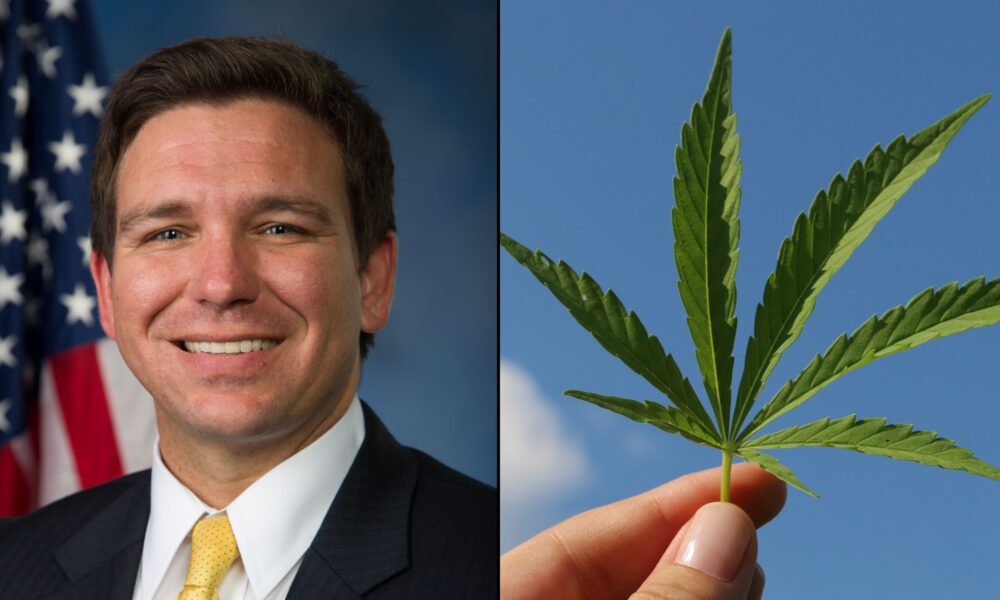If Florida Gov. Ron DeSantis (R) needs some advice on how to promote “economic and personal freedom,” the state of Colorado is “happy” to explain the advantages of marijuana legalization, Gov. Jared Polis’s (D) office said after the Republican presidential candidate doubled down on his opposition to cannabis reform.
On Friday, DeSantis peddled a dubious claim that Colorado’s illicit market is “bigger” today than it was before legalizing adult-use cannabis in 2012, justifying his own personal opposition to the reform.
In response, a spokesperson for the Colorado governor’s office offered to correct the record for the 2024 GOP presidential hopeful in a statement to Marijuana Moment.
“The facts are that Colorado voters approved the legalization of marijuana which is curbing the illicit market, getting dealers off the streets, reducing youth use, funding school construction, supporting jobs and Colorado’s economy,” the governor’s spokesperson said. “Colorado is happy to provide the Florida governor advice on how to increase economic and personal freedom like we have in the free state of Colorado.”
In an interview on the radio station KCPS that aired on Friday, first noted by Florida Politics, DeSantis had challenged the idea that regulating marijuana sales puts illicit operators “out of business,” stating that it’s an “interesting” concept that he says hasn’t played out in Colorado, despite evidence to the contrary.
“There have been states like Colorado who’ve done things like legalized marijuana and the argument was, well, you want to have a black market? It will be above-board, taxed and all that stuff,” DeSantis said during the interview. “Yet Colorado has a bigger black market of marijuana since they’ve legalized it.”
It’s well-understood that enacting legalization doesn’t fully eliminate the illicit market, and states have had varying degrees of success to that end. But research indicates that Colorado has been among the most effective at transitioning people to the legal marketplace.
One report from Leafly and Whitney Economics that was published in 2022 found that nearly all (99 percent) recreational marijuana sales in Colorado now take place at licensed retailers.
The city of Denver also released a report in July indicating that its local regulatory framework has effectively reduced the size of the illicit market, with law enforcement processing a record low amount of illegal cannabis in 2022.
These are just a couple metrics of success that advocates and stakeholders have pointed to as they’ve promoted the state’s industry, which launched its first-ever legal marijuana sales 10 years ago this week.
But in DeSantis’s retelling, the illicit market has actually expanded in Colorado, which is one reason he remains opposed to the reform that voters in his own state may have the chance to decide on this November, depending on the outcome of a state Supreme Court challenge from Florida Attorney General Ashley Moody (R).
Despite voting for a handful of reform amendments while serving in Congress, DeSantis has done little to endear himself to the cannabis community since launching his presidential bid. He’s maintained steadfast opposition to the policy change and said last summer that he would not move to federally decriminalize cannabis if elected.
He also recently suggested that the increase in Florida’s medical cannabis patient population is partly due to people using the program as a “pretext” for recreational use.
Floridians, meanwhile, are ready for reform, polling shows. Nearly seven out of ten registered Florida voters say they support the marijuana legalization initiative, with majorities of every demographic surveyed in favor of the reform, according to a survey that was released in November.
—
Marijuana Moment is tracking more than 900 cannabis, psychedelics and drug policy bills in state legislatures and Congress this year. Patreon supporters pledging at least $25/month get access to our interactive maps, charts and hearing calendar so they don’t miss any developments.
Learn more about our marijuana bill tracker and become a supporter on Patreon to get access.
—
Economic analysts from the Florida legislature and the governor’s office estimate that the marijuana legalization initiative would generate between $195.6 million and $431.3 million in new sales tax revenue annually if voters enact it.
Meanwhile, DeSantis signed a bill that took effect over the summer that added restrictions to medical marijuana advertising and manufacturing, prohibiting any products or messages that promote “recreational” cannabis use, while adding more stringent eligibility requirements for workers in the industry.
He also approved a bill in June that expressly prohibits sober living facilities from allowing residents to possess or use medical marijuana, even if the patient is certified by a doctor to legally use cannabis therapeutically in accordance with state law. All other doctor-prescribed pharmaceutical medications may be permitted, however.
The governor signed legislation in July banning sales of any consumable hemp products—including cannabis “chewing gum”—to people under 21, an expansion of an existing prohibition on young people being able to purchase smokable hemp.
In the legislature, meanwhile, a Florida Republican senator also introduced a bill last month to allow licensed medical cannabis businesses to take state tax deductions that they are barred from claiming at the federal level under an Internal Revenue Service (IRS) code known as 280E.
Conversely, another GOP state lawmaker filed legislation on Friday that would impose strict limitations on THC potency if recreational legalization is approved by voters.
VA Is Funding New Research On Psychedelics’ Benefits For Veterans With PTSD And Depression
Read the full article here









